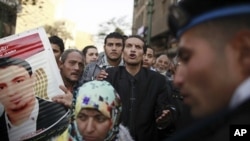Egypt has begun three days of mourning for the victims of the worst soccer violence in the nation's history.
The people of Port Said are reeling after the spasm of violence tore through this coastal town. At least 74 people were killed when fans rioted and many are blaming the military government for failing to maintain security.
Few could believe their local football fans, rowdy as they have been in the past, would ever do anything this deadly. Many saw a sinister hand behind the rioting.
Currency trader Ahmad Hosni believes it was planned by the army and the police. Standing outside closed shops on a largely deserted street, he asks “how many matches have taken place and nothing like this happened? They want to mess up the country.”
Nearby, driver Mamdouh Hassan questions how fans managed to get weapons into the stadium in the first place. He says no one was searched, and they brought in batons and knives. Hassan believes “something else” is behind the violence.
Protesters, some carrying batons themselves Thursday, converged on the town's main government building. They too blamed the army, the police and “the old regime” of deliberately allowing the violence to get out of control.
Video of the match, watched by millions live and millions more in constant repeats, show police standing still as fans surged onto the field.
Like their counterparts in Cairo where protests were gaining strength, people in Port Said hurled accusations of deliberate negligence by officials to make a case for continued military rule. They sought - and got - the local governor's resignation.
Parliament joined human rights groups in demanding an investigation. The government also announced it has suspended the heads of Port Said's security and police investigations.
But for some, the government's conduct remains suspect. Port Said lawyer Ahmed, who gave just his first name, says he is particularly appalled the violence came after the military council pointedly kept the nation's emergency laws in place for cases of “thuggery.”
“So why you say that you're going to keep emergency case for something like [this] if you're not intending to do it," Ahmed asked. "So why just keep it? I don't know this is between the ministry of the interior and the ministry of the army [defense]."
Some also see the diehard fans being used as pawns. The “ultras” as they are known, have long tangled with police and during the revolution one year ago sided with the protesters.
The events of the intervening year, culminating in the soccer riot, have left many in despair. Salah el Banna is among the doctors at Port Said General Hospital who have been treating the injured.
He says before the revolution, the police used to intervene, establishing cordons and proper security at the entrances. He argues that those same standards must still be applied.
But the irony is not lost on several observers of the unrest; in the last few months they note, police have not hesitated to intervene when the gatherings are against the government.
| Join the conversation on our social journalism site - Middle East Voices. Follow our Middle East reports on Twitter and discuss them on our Facebook page. |




